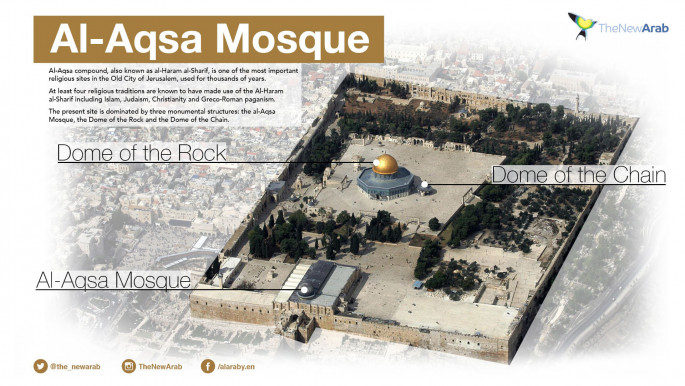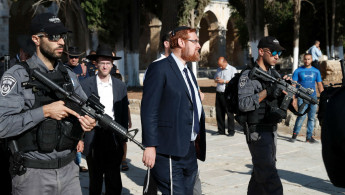Far-right Israeli lawmaker visits Aqsa mosque compound in Jerusalem
Far-right Israeli lawmaker Yehuda Glick visited the flash-point al-Aqsa Mosque compound on Tuesday during a one day break from a two year Israeli government ban.
Glick, a US-born rabbi, survived an assassination attempt by a Palestinian gunman in 2014 after leading a campaign for Jewish prayers at the sensitive holy site.
His visit on Tuesday was meant to test the resolve of Israeli Prime Minister Binyamin Netanyahu's government as it mulls whether to allow such visits to resume.
They were banned in 2015 after unrest that erupted over Palestinian fears that Israel was challenging the delicate status quo of the site.
At least one other Jewish lawmaker, Shuli Moalem-Refaeli of the far-right Jewish Home party, also visited on Tuesday morning, according to the Waqf, a Muslim organisation that administers the site.
No incidents occurred as Glick toured the Haram al-Sharif mosque compound, known to Jews as the Temple Mount.
Some Muslim worshippers yelled "Allahu akbar" (God is greatest) as he left and he waved to them.
 |
|
Jewish custom prohibits Jews from visiting and praying at the site, but Glick admitted praying to himself as he walked the grounds in his bare feet.
Asked afterwards whether such visits are provocations that risk more bloodshed, Glick told journalists: "Those who are responsible for terror are the terrorists and those who incite them, not the victims."
Masud Ganaim, of the Arab Joint List alliance, said allowing right-wing Israeli politicians into the compound had "the goal of provoking Arab and Muslim sentiment and inflaming the situation".
Jordan, the custodian of Muslim holy sites in Jerusalem, condemned the visits as "unacceptable".
Mohammad al-Momani, minister of state for media affairs, said allowing the visits was an "irresponsible decision that will increase tension and escalation at a place holy to all Muslims".
He called on Israel "as the occupying power to take measures to prevent provocations by extremists against the Al-Aqsa mosque".
New Israeli security measures installed at the holy site following a deadly 14 July shooting had inflamed tensions in Jerusalem and the region, leading to deadly clashes and mass protests by Palestinians before they were eventually removed.





 Follow the Middle East's top stories in English at The New Arab on Google News
Follow the Middle East's top stories in English at The New Arab on Google News
![Netanyahu furiously denounced the ICC [Getty]](/sites/default/files/styles/image_330x185/public/2024-11/GettyImages-2169352575.jpg?h=199d8c1f&itok=-vRiruf5)
![Both Hamas and the Palestinian Authority welcomed the ICC arrest warrants [Getty]](/sites/default/files/styles/image_330x185/public/2024-11/GettyImages-2178351173.jpg?h=199d8c1f&itok=TV858iVg)
